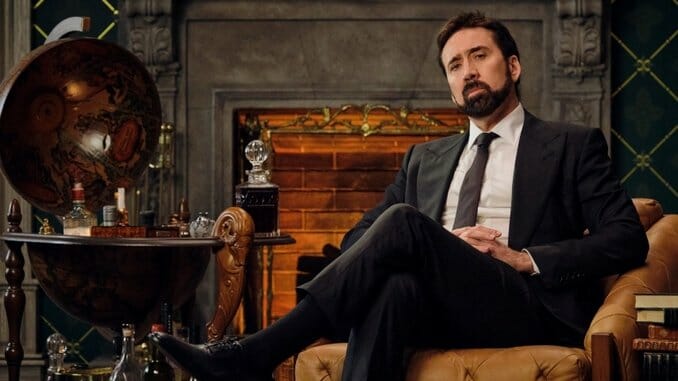If We All Venmoed Nicolas Cage Some Cash Maybe He Wouldn’t Have to Do Stuff like History of Swear Words
Photo by Adam Rose, courtesy of Netflix
As the host of Netflix’s new comedy series History of Swear Words, Nicolas Cage sits in a set designer’s idea of a fancy, upper class study, with an ornate wooden globe that doubles as a liquor cabinet by his side. Dressed in a classic suit that recalls both John Wick and whatever ska band you liked in high school, Cage showily ruminates on our most potent profanities, saying each fuck and bitch with such passion and tenderness that it sounds like he’s sending his child off to college. His intros and voice-overs are the framework for a show that explores these bad words from a historical perspective and with an eye for their everyday usage, alternating between interviews with lexicographers and scientists, and I Love the ‘90s-style clips of comedians remembering that these words exist. Hosting a show like this is probably a great gig during a pandemic, considering it’s a small set with no other performers. Still, it’s probably not quite what Cage fans expected from the actor back in 1996, when he was fresh off an Oscar for Leaving Las Vegas and starring in one of the biggest action hits of the decade in The Rock.
I’m not here to slander Netflix’s History of Swear Worlds. It’s a perfectly fine way to kill 20 or so minutes, a breezy overview of how a half-dozen of the most popular cuss words have been used throughout their history. And Cage is a lot of fun in it—he commits as thoroughly as he does to all of his projects, ostentatiously hosting the show in full overblown camp mode.
-

-

-

-

-

-

-

-

-

-

-

-

-

-

-

-

-

-

-

-

-

-

-

-

-

-

-

-

-

-

-

-

-

-

-

-

-

-

-

-








































